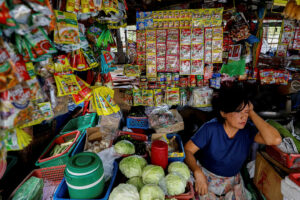THE Department of Trade and Industry (DTI) has set a target of P2.4 trillion for the size of the mom-and-pop retail segment, known in the Philippines as sari-sari stores.
The target, which projects the size of the sari-sari market by 2030, was contained in a wholesale and retail sector jobs blueprint, which the DTI launched with private-sector partners on Monday.
Known as Section G: Job Blueprint for the Wholesale & Retail Trade, the roadmap aims to create sustainable employment opportunities, enhance the competitiveness of Philippine businesses, and position the country as a significant global player in wholesale and retail.
Trade Secretary Ma. Cristina A. Roque said the blueprint will initially focus on sari-sari stores.
“We will prioritize them first because they are over a million, so once they level up, even if it is just a 10% increase in sales, that is already a huge jump, and that will really provide jobs of one or two more per store,” she added.
The blueprint estimates the number of such stores at over 1.3 million, most operating with limited capital, informal business structures, and limited access to wholesale supply and digital tools.
“Their highly fragmented nature makes sector-wide modernization a challenge — but also a significant opportunity,” according to the blueprint.
“Strengthening their role through improved training, digital integration, and supply chain access can transform sari-sari stores into more resilient microenterprises, creating jobs and enhancing community-level commerce,” it added.
According to the blueprint, sari-sari stores are estimated to currently account for 8.3% of the informal workforce.
With average annual sales per store of P861,000 to P1.123 million, sari-sari stores account for 15%-20% of the retail market.
“The envisioned future for the sari-sari store sector is robust, with strategic goals set to double its economic contribution by 2030,” according to the blueprint.
“This vision includes transforming these stores into modern, digitally integrated units that continue to serve their communities while accessing broader markets,” it added.
Ms. Roque said that the DTI’s micro-financing arm, Small Business Corp., has a P10-billion fund available for micro, small, and medium enterprises, which can be tapped to address the sari-sari segment’s limited access to capital.
“And soon I will be launching a P1-billion women’s fund. So anytime next week, we will have the Women’s Enterprise Fund,” she added.
Sari-sari store operators are hindered by a lack of business skills, thin margins, and a fragmented market.
“They also face stiff competition from larger retail chains and online marketplaces, which offer broader product ranges at competitive prices,” according to the blueprint.
“Additionally, complex regulatory requirements make it challenging to comply with business registration,” it added. — Justine Irish D. Tabile

